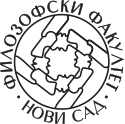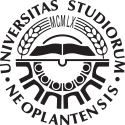15FD4 - Ancient Philosophy
| Course specification | ||||
|---|---|---|---|---|
| Course title | Ancient Philosophy | |||
| Acronym | 15FD4 | |||
| Study programme | Philosophy | |||
| Module | ||||
| Type of study | third degree doctoral academic studies | |||
| Lecturer (for classes) | ||||
| Lecturer/Associate (for practice) | ||||
| Lecturer/Associate (for OTC) | ||||
| ESPB | 10.0 | Status | ||
| Condition | none | Oblik uslovljenosti | ||
| The goal | The main intention of teaching in the subject "Ancient Philosophy" is the thematization of fundamental questions, key views and ideas of the leading Greek philosophers, both at the general level and in the individual elaborations. Also, the objective of the course is to train students for self-analysis, both verbally and literally, of various fragments and texts of ancient philosophers. Then, the course will enable students to gain competence in numerous works, taking into account available original works and comments from contemporary philosophers. Finally, the course shows the influence of the ancient philosophical heritage on the development of the latter philosophy, and in general on the "Weltanschauung" of Western civilization. | |||
| The outcome | Students will gain deeper insights into one of the most important epochs in philosophy, which will enable them to be completely independent in later professional engagement with philosophy. | |||
| Contents | ||||
| Contents of lectures | The problem of the beginning of ancient philosophy; Postulating the form of thinking of philosophy as conceptual thinking; One and a multitude; Arche and stoiheion; Logos in Greek philosophy; Physis-nomos; Degrees of knowledge and relation of knowledge and true understanding in the State, Menon and Teetet; Learning about ideas in Plato's dialogues; Learning about the soul in Fedon, Fed and State; Dikaiosyne as the constitutive factor of valid politics and valid citizens; Criticism and definition of the Sophists in the State and Sophist; The perception of Demiurge in Timaj; Aristotle's Aetiology; Teleology and necessity; Theology, Dynamis-energeia (and entelecheia), Categories; The soul and body in the scriptures About the soul; Bliss and friendship in Aristotle's works; Aristotle's Policing Lesson, Peripat as a Scientific-Research Institution; Logic Stoe; Cosmology Stoe; "Life in harmony with nature"; The difference between atomic and epicurean understanding of atoms; Epicurean understanding of gods and deaths; Epicurean therapeutic of passion and fear: ataraxia; Piron's critique of sensual knowledge and Enesy's critique of the mind; The significance of Cicero for translating philosophical terminology into Latin; Novopitagorejstvo and new kinism; Helenist-Jewish synthesis painted in Philon from Alexandria; Plotin's capture of God and the perception of emanation; Other Newly-Platonic Schools. | |||
| Contents of exercises | ||||
| Literature | ||||
| ||||
| Number of hours per week during the semester/trimester/year | ||||
| Lectures | Exercises | OTC | Study and Research | Other classes |
| 5 | 3 | |||
| Methods of teaching | Dialogical and research methods, analysis of the texts, discussion. | |||
| Knowledge score (maximum points 100) | ||||
| Pre obligations | Points | Final exam | Points | |
| Activites during lectures | 20 | Test paper | ||
| Practical lessons | Oral examination | 50 | ||
| Projects | ||||
| Colloquia | ||||
| Seminars | 30 | |||

